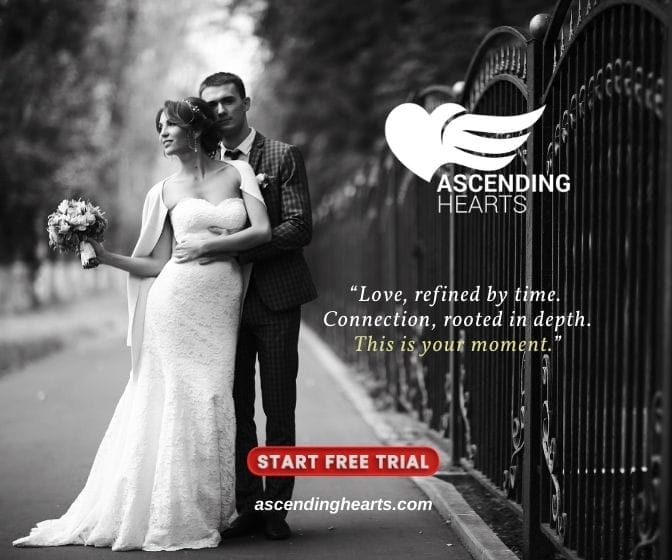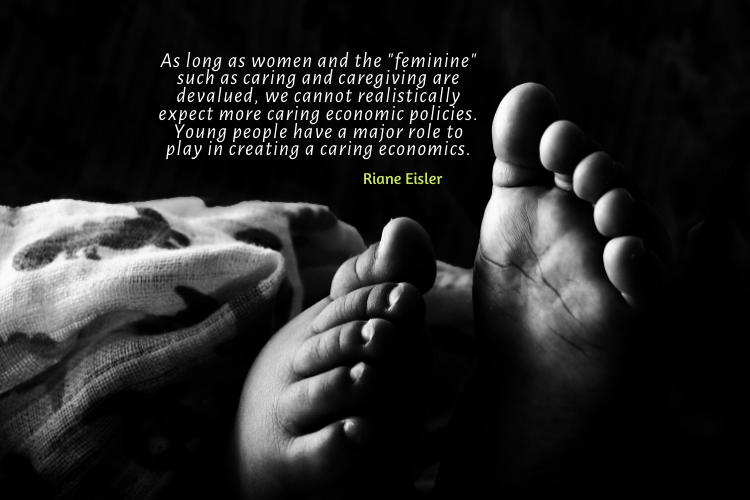Riane Eisler: Nurturing our Humanity

Sandie Sedgbeer: You’ve already talked about how we need to promote the partnership configuration to build a more equitable, caring, and sustainable future. And the first step in constructing the foundations for this partnership future starts with four interactive, mutually-supporting cornerstones. Tell us about those.
Riane Eisler: We’ve touched on them, the first one is childhood. We need to really take note of what we know from neuroscience that nothing less than how people’s brains develop. So, we know that what children first experience and observe is very different in domination or partnership environments. In a domination environment, children learn early on to equate differences. Beginning with the difference in form between the male and female form of our species with superiority or inferiority, with dominating or being dominated, with being served or serving. That’s a template that’s implanted in a child’s brain before the brain is developed, much less our cognitive and critical faculties. Right? And then it can be applied to every difference: racial, religious, it doesn’t really matter. It’s the ingroup versus the outer group. And it’s really rooted in that agenda, but we have a gender system of values, and that’s something that we’ve got to unpack and understand. I mean, why is there always money for prisons? I can tell you why, it’s the stereotype of the punitive father, right? The punitive head of household. Or there’s always money for weapons and wars. So that’s another domination, masculine stereotype, the hero as a killer. But somehow there isn’t enough money for caring for people’s health, for caring for children, for keeping a clean and healthy environment. You know, for both Adam Smith, the father of capitalism and Karl Marx, the father of socialist theory, that was just reproductive women’s work, right? So, it’s devalued. And once we understand that, we can really stop devaluing it because it’s what really makes for better lives. And at this point, if we don’t take care of nature, our children have no future.
Sandie Sedgbeer: Absolutely. Let’s talk about some of those other cornerstones. I mean, you’ve got gender relations, economic relations, and narratives and language
Riane Eisler: Well, I already started a little talking about economics, because whether it’s neoliberal capitalism, you know, so-called trickle-down economics, which is really, domination economics is what’s really going on. You can see it in feudal times when people were supposed to content themselves with scraps dropping from the opulent tables of those on top. Whether it was an ancient Chinese emperor or an Arab sheik, there with this feudalism. It’s all domination economics. And you can have it in socialism too. You know, the two mass applications of socialism in the former Soviet Union and China, very violent regimes with terrible environmental problems. You see it today, even in China. But the point of it is we need to move forward and leave behind that gender system of values to an economic system that recognizes that the real wealth of a nation, of our world, is not financial. You know, like the stock market going up and down. Uh, it consists of the contributions of people and of nature. So, we need, but we haven’t had economics that really supports caring for people starting in childhood, caring for our mother earth. And you know, there are trends in this direction, which is very exciting. But there are, of course, oppositions. The nations that have moved most to the partnership side, modern nations like Sweden, Finland, and Norway, they’re not perfect, but at the beginning of the 20th century, they were poor, there were famines. And today they’re invariably in the highest ranks of the World Economic Forum’s Global competitiveness reports. They have a generally high standard of living, far less poverty, far less crime, and they also have more gender equity. They have policies where caring is voted for by both men and women because the status of women, of the feminine, has risen. So, they have universal health care, and very generous paid parental leave for both mothers and fathers. Parenting education, elder care with dignity, very high-quality early childhood education, which we need for our post-industrial age. This country, the United States, is going to pay very dearly if we don’t change rapidly and start investing in high-quality human capital. You know, that economists tell us is essential for our knowledge, service age, flexible people who are resilient, who can work in teams, who can adjust to change, including a rapid technological change that largely hinges on the quality of care and education children receive early on.
We have introduced a new metric, a new, it’s in my books, but the social wealth, an index is something that we are developing now; that we can show policymakers – what the state of human capacity development is and what investments make for a better or a worse state. You know, the United States, not coincidentally, has the highest child poverty, the highest maternal mortality, and the highest infant mortality rate of any developed nation. Yeah, it does less than half of what other developed nations do in terms of family support.
Sandie Sedgbeer: You were talking about some of the cultures that have turned themselves around and created a partnership system, and it’s working pretty well for the most part. There are other cultures that you write about in the book that have had these peace systems, just as a way of being and living, and they haven’t changed, and even though they’re not perfect, they give us great hope. Ultimately, it’s governments that are going to make these changes, but what can we do as individuals. To spur these changes along.
Riane Eisler: Well, I think that joining the partnership movement, and the first step in that is changing our consciousness. For example, Nurturing our Humanity provides evidence that the evolution of love played a major role in the emergence of humanity. This is just simply not part of what we’re being taught. We have evidence that the default for humans – and we know this from biological and social science – is not domination and violence, but caring, sharing, and nonviolence. Becoming aware of this, and helping to change the consciousness of other people is a very important step. I mean, it’s really all about the last cornerstone: story and language. Because what, again, and again comes through when you read my work is that we’ve been told the wrong story and us humans live by stories.
So, starting to tell the story that’s backed up by the fact of what really is a partnership configuration. It’s not coincidental that in Sweden, Finland, and Norway, half of the national legislature is female. And as the status of women rises, men no longer feel it’s such a threat to their status, to their “masculinity” to also embrace and vote for more caring policies. So, understanding is changing our consciousness. Then also educating ourselves so that we can each be a leader in the partnership movement. And we, at the Center for Partnership Studies, have webinars and courses online. You can go to the centerforpartnership.org and find out about them, and about our social wealth economic indicators. If you are particularly interested in changing economics, join one of our courses.
Talk to your legislature about it. Talk to the organizations you belong to about what we need, and how what we do or do not measure makes a difference. And these metrics show the enormous economic value of the work of caring for people starting in childhood and caring for our planet. So, these are the first steps. If you are in a position of authority, introduce a bill to have your state legislature help to develop and adopt the social wealth index, support bills that are so often marginalized as just women’s issues, like paid parental leave. We only have about four states now that have them. This is ridiculous. We have to have them nationally. People need to understand the reality, like the studies on adverse childhood experiences. We can do something about it. We can have parenting classes in high schools. There’s so much that you can do depending on just where you are, but it really starts with leaving behind the old categories and starting to connect the dots.
Sandra Sedgbeer: You have provided a beautiful blueprint in nurturing humanity, but how confident are you that humanity will reach that place within itself where it elects to follow your blueprint?
Riane Eisler: Well, it’s an existential commitment, isn’t it? We just simply make the commitment, because if we don’t do anything, there’s no chance, is there? So, we have to. Am I confident? No, I don’t have a crystal ball. I don’t know what’s going to happen, but I do know that the domination system is really toxic. It’s toxic to our species, it’s toxic to individuals, it’s toxic to men, to women, to children, and it doesn’t have to be this way. And once we understand that there is a partnership alternative and that we do have the blueprint for building it, starting with these four cornerstones, then we can really make it happen. And it won’t be easy, but it can be done. You know, human cultures are human creations for goodness sakes. We can recreate them. Not to go back to any so-called good old days but using the best of technology that we have. Because it isn’t the technology, it’s what kind of values guide it, right? In moving towards the partnership side, it’ll never be ideal, but our default, as I said, is not domination and violence, but carrying, sharing, and non-violence. There is a study I can tell you about where people’s pleasure centers in the brain light up more when they share rather than when they win.
Continue to Page 4 of the Interview with Riane Eisler
A veteran broadcaster, author, and media consultant, Sandie Sedgbeer brings her incisive interviewing style to a brand new series of radio programs, What Is Going OM on OMTimes Radio, showcasing the world’s leading thinkers, scientists, authors, educators and parenting experts whose ideas are at the cutting edge. A professional journalist who cut her teeth in the ultra-competitive world of British newspapers and magazines, Sandie has interviewed a wide range of personalities from authors, scientists, celebrities, spiritual teachers, and politicians.






